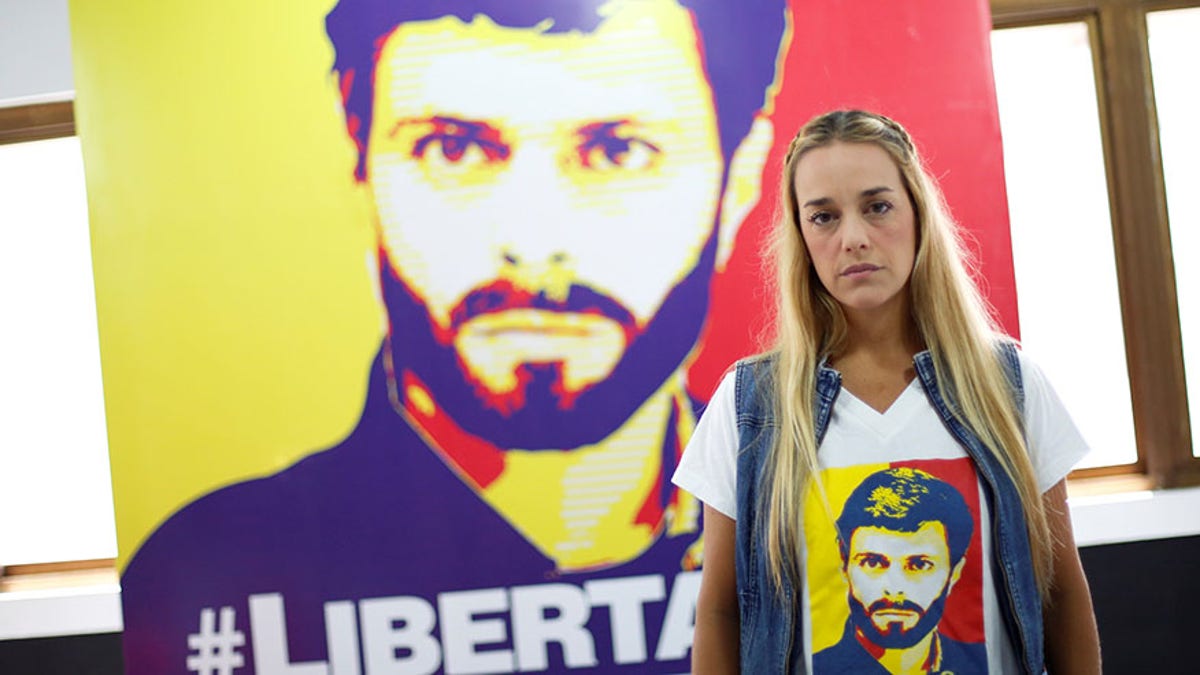
Lilian Tintori, wife of jailed Venezuelan opposition leader Leopoldo Lopez, on Jan. 18, 2017. (Reuters)
CARACAS – Leopoldo Lopez was isolated 548 of his first 1,000 days in prison. And the count is likely to grow, as he continues to be the most visible symbol of the Venezuelan opposition.
Just recently, after his wife’s visit to President Trump in the White House, he was punished for it with 15 days of no visitors.
“Leopoldo is a moral leader, whose leadership is feared by the regime,” Lopez’s wife, Liliana Tintori, said to Fox News. “They are afraid of his words, his ideas, his power to motivate Venezuelans, so they keep him isolated.”
NEW 'ANTI-COUP SQUAD' IN VENEZUELA MONITORS, HUNTS OPPONENTS PERCEIVED AS RISK
For the last three years, the Harvard-educated lawyer and economist has lived in a 7 by 10 ft. cell in the inhabited fourth floor of a military prison outside Caracas. It has a bed, a small window and no artificial light. At 8:00 p.m. everything gets dark until the next morning.
Tintori and her mother in law bring him food once a week, each time submitting to a strip search that they find humiliating — even the underwear has to go.
They also bring him books but many times they don’t make it past the inspection room. He is not allowed to write, either.
"He is forbidden to write and they have stolen his writings. Leopoldo does not have access to a telephone, to talk or to share with other prisoners. He's being watched all day," Tintori said.
“He has chosen to exercise, meditate and read when allowed,” she said.
VENEZUELA DENYING TRIAL TO US MAN HELD SINCE JUNE, CASE GOES TO THE UN
The once-wealthy oil producing nation has fallen on increasingly hard financial times since Nicolás Maduro took power following the death of socialist leader Hugo Chávez in 2013. Politically, the opposition says, the government has become an authentic dictatorship.
Lopez, a former mayor of the Chacao section of Caracas, was detained on Feb. 18, 2014 accused of inciting violence during a wave of deadly anti-government protests. He was sentenced to nearly 14 years in prison in proceedings widely condemned by the U.S. and human rights groups as a politically motivated show trial.
In the wake of President Maduro's crackdown in 2014, the U.S. Congress passed legislation to freeze the assets and ban visas for anyone accused of violating the human rights of those opposing Venezuela's government.
More recently, the Treasury Department accused Maduro’s vice president, Tareck El Aissami, and an ally of being major cocaine traffickers. El Aissami is the most senior Venezuelan official to ever be targeted by the U.S.
Meanwhile, Venezuelan jails still hold 117 political prisoners, including high-profile members of the military and former congressmen.
VENEZUELA SHUTS OFF CNN IN SPANISH AFTER CRITICIZING STORY
Tintori describes the treatment Lopez is receiving as torture. She cited a recent example in which guards entered his cell and started destroying possessions he held dear.
“On the early hours of Feb. 18, when he marked three years of being unjustly imprisoned, they did a very deep inspection of his cell, tore one of his grandfather’s pictures and also a drawing that my daughter Manuela had given to him,” Tintori related. “They even searched his trash. All this is to bend it, so that we keep quiet.”
But quiet she is not. The mother of two small children, she has been tirelessly fighting for her husband’s release in Venezuela and abroad. She has travelled the world advocating on his behalf and decrying the humanitarian crisis her country’s been through in the last decade.
“Venezuelans are fighting, resisting because Venezuela is worth it,” she told Fox News.
Last month she was one of President’s Trump first foreign visitors at the White House.
“He did not hesitate to describe the Nicolas Maduro government as a regime that violates human rights,” she said.
“We were surprised at how aware they were of our situation.”
While Secretary of State Rex Tillerson has urged a negotiated transition to democratic rule in Venezuela, it is not clear what policy tools the U.S. has at its disposal given Maduro's unwillingness to yield power.
The two countries haven't exchanged ambassadors since 2010.
